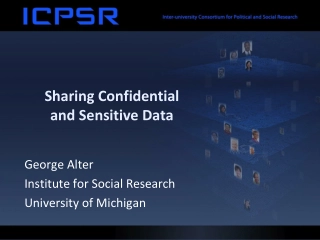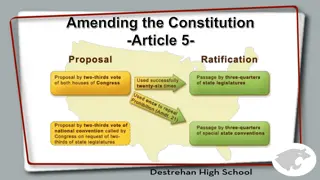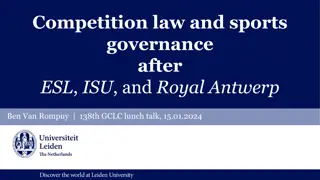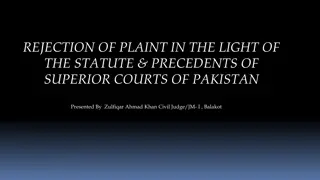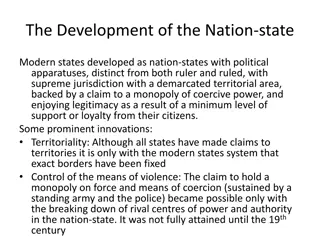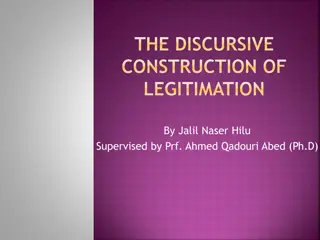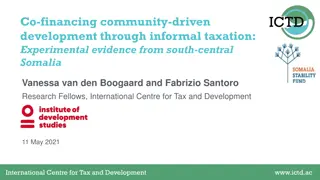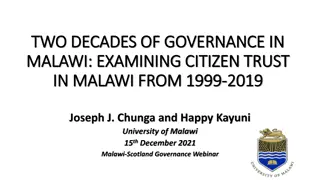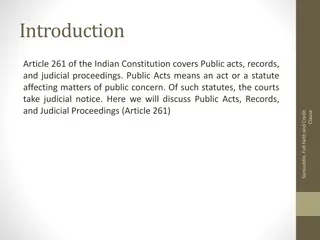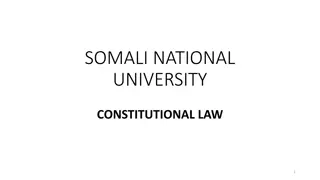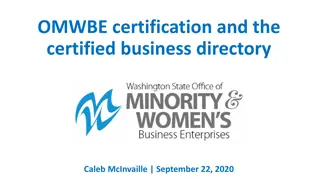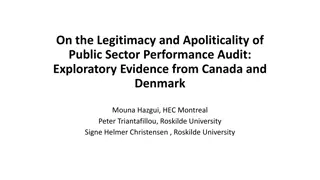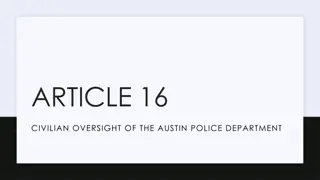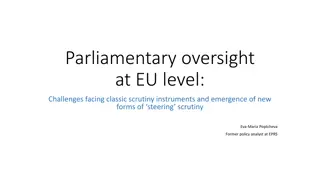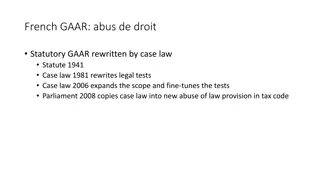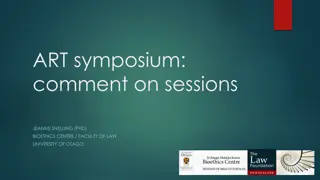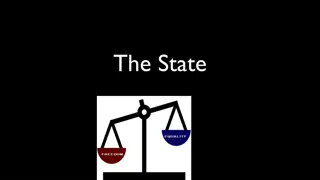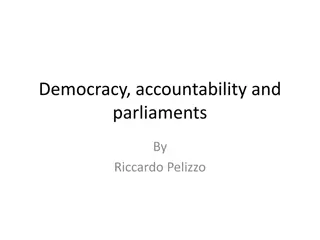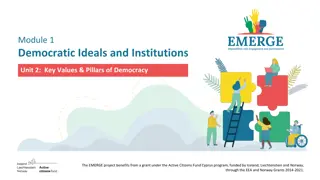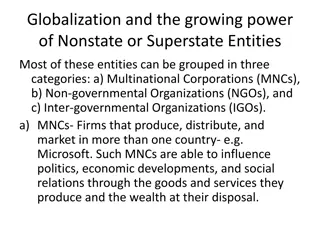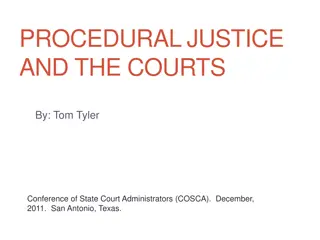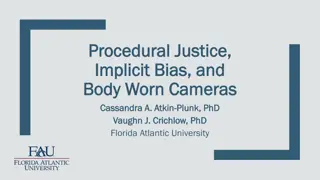Understanding the Importance of Data Sharing in Scientific Research
Data sharing plays a crucial role in scientific research to uphold transparency, reproducibility, and legitimacy. Skepticism of science due to fraud, publication bias, and challenges underscores the necessity for sharing confidential data. Professional associations, funding agencies, and journals ad
2 views • 39 slides
Unrest and Uncertainty: Post-Election Turmoil in Pakistan
The recent national elections in Pakistan have sparked controversy and unrest, with former prime ministers Imran Khan and Nawaz Sharif both claiming victory amidst allegations of voter fraud and political restrictions. The country faces economic challenges, internal insurgencies, and strained intern
8 views • 5 slides
Origins of Government Power in the United States
The U.S. government derives its power from the consent of the governed, reflecting principles of popular sovereignty, general will, and majority rule. Philosophers like Hobbes, Locke, and Rousseau have influenced the concept of government's legitimacy through the consent of the people. The evolution
0 views • 13 slides
Understanding RIPE and the Social Contract in the Age of Enlightenment
The RIPE Social Contract delves into the theory of social contracts originating from the Age of Enlightenment. It explores the legitimacy of the state's authority over individuals and discusses the expectations and roles of RIPE, NCC, and RIRs within the internet ecosystem. RIPE's objective is to co
0 views • 33 slides
Competition Law and Sports Governance: Analysis of ESL, ISU, and Royal Antwerp Cases
This presentation delves into the intersection of competition law and sports governance, focusing on landmark cases such as ESL, ISU, and Royal Antwerp. It explores the positioning of sports governing bodies, the legitimacy of their authority, gatekeeping powers, and the specific challenges faced in
1 views • 24 slides
Challenges Faced by Queen Elizabeth I and Medical Advancements in History
Explore the challenges encountered by Queen Elizabeth I, including issues with legitimacy, gender, and threats from abroad. Learn about the pivotal role of James Simpson in advancing medicine with the introduction of anaesthetics. Discover the intricacies of Elizabethan government and the notable tr
0 views • 11 slides
Rejection of Plaint under the Code of Civil Procedure in Pakistan
The Code of Civil Procedure in Pakistan governs the administration of civil justice, with provisions for rejecting a plaintiff's claim under specific circumstances. Grounds for rejection include insufficiently disclosing the cause of action, improper valuation of relief, insufficient stamping on pap
0 views • 17 slides
Understanding Power and Authority: Exploring Legitimacy Through Works of Lukes and Weber
Diving into the concepts of power and authority, this discussion focuses on the crucial role of legitimacy in distinguishing between the two. Drawing insights from the works of Lukes and Weber, the discourse delves into the dimensions of decision-making, non-decision-making, and shaping desires to i
0 views • 28 slides
Evolution of the Nation-State and Modern State Concepts
The development of the nation-state marks a significant shift in political organization, characterized by centralized power, territoriality, and legitimacy gained through citizen support. Key innovations include territorial demarcation, monopolization of coercion, impersonal power structures, and th
0 views • 8 slides
Addressing the Human Factor in Data Access: Incentive Compatibility, Legitimacy, and Cost-Effectiveness
Allowing confidential data for research is advocated in this study, emphasizing the risks humans pose, the effectiveness of legitimizing security measures, and the shift towards user engagement and shared responsibilities for better security and cost efficiency in data access.
0 views • 11 slides
Discursive Construction of Legitimation: Understanding Authority and Ideology
Systems of authority aim to establish legitimacy through discourses. Legitimation involves self-orientation, justification, and the imposition of ideologies. This practice encompasses various principles and categories such as moral evaluation, rationalization, and multimodal approaches, shaping soci
1 views • 36 slides
Key Terms in Ch. 21: Reaction, Revolution, and Romanticism, 1815-1850
The key terms discussed in Chapter 21 include principle of legitimacy, balance of power, ideology, conservatism, principle of intervention, ultraroyalists, ministerial responsibility, and liberalism. These terms highlight important political philosophies and concepts during the post-Napoleonic era a
0 views • 17 slides
Co-financing Community-Driven Development Through Informal Taxation: Experimental Evidence from South-Central Somalia
Research explores the use of matching grants to incentivize informal taxation for community-driven projects in Somalia's Gedo region. Findings show increased informal contributions to public goods without crowding out other revenues, benefiting state legitimacy. Implications for development partners
0 views • 34 slides
Understanding Legitimacy in Family Law
Legitimacy in family law refers to the status acquired by a person born in lawful wedlock, as opposed to illegitimacy where a child is born out of wedlock. Legitimation is the process through which an illegitimate child gains legitimate status. In Nigeria, customary law also recognizes legitimacy ba
0 views • 22 slides
Examining Citizen Trust in Malawian Governance Over Two Decades (1999-2019)
This paper critically analyzes public trust in key government institutions in Malawi from 1999 to 2019, highlighting a general decline in trust levels and its impact on political legitimacy. The study explores factors influencing public trust, such as perceptions of government performance, integrity
0 views • 12 slides
Understanding Article 261 of the Indian Constitution
Article 261 of the Indian Constitution addresses public acts, records, and judicial proceedings, emphasizing the federal nature of India's governance structure. It delineates the powers and relationships between the central and state governments through legislative, administrative, and financial dim
0 views • 5 slides
Normative Standards for Public Participation in Constitutional Making Process
This article delves into the importance of public participation in the constitution-making process, highlighting effective methods such as consultation, inclusiveness, and credibility of reviewing bodies. It emphasizes the shift towards participatory constitution-making and the necessity of involvin
0 views • 32 slides
Understanding OMWBE Certification and Business Directory
OMWBE certification is issued by a state agency in Washington to certify minority-owned, women-owned, and small businesses. Certification ensures legitimacy, independence, and adherence to criteria, tracking spending for equity. OMWBE provides federal and state certification for various business typ
0 views • 26 slides
Understanding Public Sector Performance Audit in Canada and Denmark
The study explores the legitimacy and apoliticality of Performance Auditing (PA) in Canada and Denmark, focusing on how Supreme Audit Institutions (SAIs) maintain political neutrality and legitimacy. Existing knowledge points to the inherent political nature of PA and the challenges SAIs face in pre
4 views • 9 slides
Career Opportunities for ODs in Academia: Teaching & Research Needs
The demand for more optometry faculty with OD degrees is increasing due to the growing profession, expanding scope, and the need for greater expertise in teaching basic science. There is a call for more optometry faculty to address research needs, especially in traditional and biomedical topics. Emp
0 views • 11 slides
Enhancing Civilian Oversight of Austin Police Department
The civilian oversight of the Austin Police Department is detailed, highlighting the responsibilities of the Office of Police Oversight and the Community Police Review Commission. A renewed Article 16 proposal aims to improve transparency, accountability, and community relations. The mission of the
0 views • 17 slides
Illegitimate Debts and the Asian Development Bank: The Philippine Case Overview
The Philippine government's debt situation is outlined, highlighting the importance of a historical audit to determine the legitimacy of foreign loans. The General Appropriations Act of 2017 calls for a debt audit on specific projects. The audit aims to ascertain the legitimacy of contracted loans a
0 views • 15 slides
Challenges and Significance of Parliamentary Oversight at EU Level
This content delves into the challenges and constitutional significance associated with parliamentary oversight at the EU level, exploring issues such as the legitimacy of executive power, the effectiveness of scrutiny mechanisms, and the complexities of controlling the EU executive. It also discuss
0 views • 9 slides
Understanding Different Forms of Government
An institution known as government establishes and enforces rules for a group of people. This institution must possess sovereignty, legitimacy, and jurisdiction. Various forms of government exist, such as dictatorship, absolute monarchy, and constitutional monarchy, each with distinct characteristic
0 views • 12 slides
French General Anti-Abuse Rule (GAAR): Evolution and Application
The French General Anti-Abuse Rule (GAAR) has seen developments through statutory revisions and case law interpretations since 1941. This rule targets fictitious acts and acts aimed at reducing tax burdens through exploiting legal technicalities. The legitimacy of GAAR extends to tax treaties, with
0 views • 5 slides
Enhancing Democratic Electoral Processes in Africa: Challenges and Solutions
Democratic electoral processes in Africa must strive to be inclusive, transparent, and accountable to promote public confidence. The importance of independent and professional electoral governance institutions is emphasized to address the legitimacy crisis facing elections today. The SADC Secretaria
0 views • 13 slides
Language Ideologies in Dialect Contact Situations
The study explores how language ideologies influence the legitimacy and status of different dialect varieties in contact situations. It delves into the construction of power relations, social sameness and difference, and cultural stereotypes through language use. Key concepts such as language ideolo
0 views • 28 slides
Insights on Bioethics and Legal Challenges in Assisted Reproductive Technologies
Delve into discussions from the ART symposium sessions featuring Jeanne Snelling (PhD) from the Bioethics Centre, University of Otago. Explore topics such as regulatory challenges, the HART Act's suitability, procedural and substantive legitimacy, and the decision-making processes involving ACART. L
0 views • 7 slides
Understanding Family Dynamics and Relationships
This presentation explores the various aspects of families, including marriage norms, definitions of family, societal views on sexual activity, and diversity within family structures. It delves into the significance of family as a primary socialization agent, emotional support system, and provider o
0 views • 15 slides
Exploring Political Philosophy and the State's Authority
Delve into thought-provoking questions on political philosophy, legitimacy of authority, roles of the state, and individual obligations. Reflect on the state's power to enforce laws and restrictions, contrasting it with individual actions. Consider the complexities of governance, revolution justific
0 views • 9 slides
The Red Brigades: Strategy, Tactics, and Targets
The Red Brigades operated with the strategy of establishing a dictatorship of the proletariat through armed propaganda and violent actions to overthrow the state. Their tactics involved calculated political terrorism and politically motivated kidnappings and murders, avoiding mass casualties. Initia
0 views • 5 slides
Understanding Democracy, Accountability, and the Role of Parliaments
Explore the concepts of democracy, accountability, and the significance of parliaments in ensuring government transparency and citizen participation. Learn how factors like political culture, institutions, and legitimacy impact the durability of democratic systems. Discover the link between democrac
0 views • 24 slides
Understanding the Principles of a Functioning Democracy
A functioning democracy is built on principles such as the ultimate authority of the people, essential rights like freedom of expression, adherence to human rights, and the government's legitimacy from the electorate. Principles like accountability, freedom of assembly, and the separation of powers
0 views • 20 slides
Globalization and the Influence of Nonstate Entities
Globalization is shaped by the power of Multinational Corporations (MNCs), Non-governmental Organizations (NGOs), Inter-governmental Organizations (IGOs), and technological advancements. These entities wield influence on politics, economics, and social dynamics globally. The authority and legitimacy
0 views • 4 slides
Ensuring Security and Trust in Online Transactions
Establishing trust and security is crucial for online transactions. Guidelines include verifying company legitimacy, safeguarding personal information, and using secure payment methods. In case of doubt, research the company and its reputation. Tips for secure transactions are highlighted, emphasizi
0 views • 6 slides
Top 10 Aspects of Good Internal Governance in Academic Units
Legitimacy, academic voice, funding transparency, business/practice plan management, mission/strategic plan, academic program performance, individual productivity, physician compensation, physician representation/accountability, and dispute resolution are key aspects of good internal governance in a
0 views • 4 slides
American Imperialism in the Late 19th Century
The late 1880s and 1890s saw the United States embroiled in near-wars and diplomatic crises due to American expansionism. This included the annexation of Hawaii despite Queen Liliuokalani's opposition, and the debate over acquiring the Philippines for economic interests. Anti-imperialists argued aga
0 views • 5 slides
Understanding Procedural Justice and Public Trust in the Justice System
The discussion delves into the goals of the justice system, the importance of public trust and confidence, and the concept of legitimacy in the context of the courts. Despite improvements in the delivery of justice, trust and confidence among Americans, especially in minority groups, remain a challe
0 views • 39 slides
Exploring Legitimacy and Public-Private Partnerships in Cybercrime Enforcement
Investigate the legitimacy of public-private partnerships in addressing cybercrime, focusing on botnets and related issues. The study examines the classic model of legitimacy involving the state, citizens, and the market, and explores different stakeholders' roles in ensuring legitimacy in enforceme
0 views • 14 slides
Understanding Procedural Justice, Implicit Bias, and Body Worn Cameras
This content covers the concepts of procedural justice, implicit bias, and body-worn cameras in the context of law enforcement. It explores the importance of procedural justice, strategies for enhancing it, and its significance in policing, with a focus on fairness and legitimacy. The images provide
0 views • 38 slides
